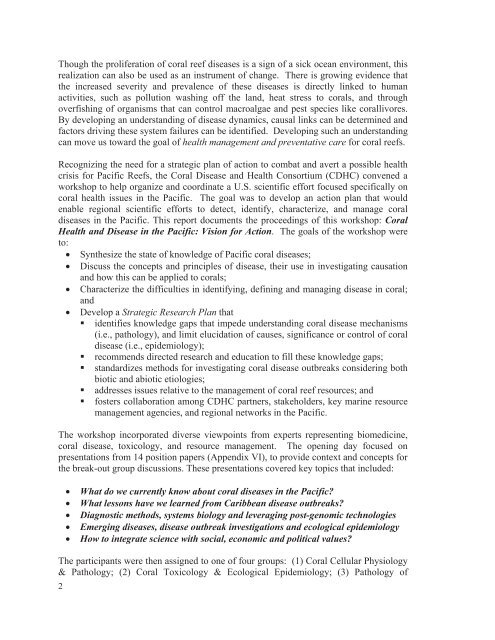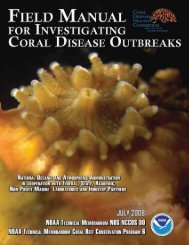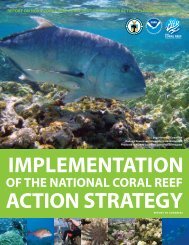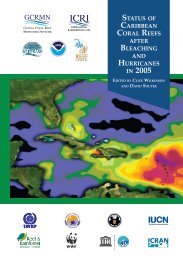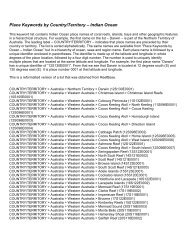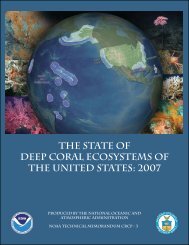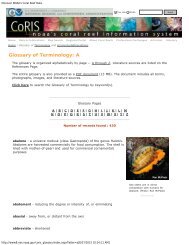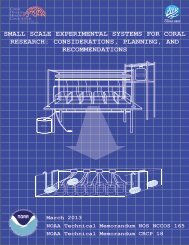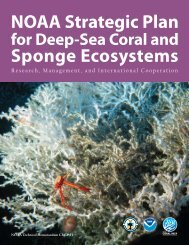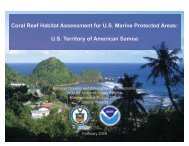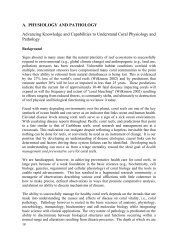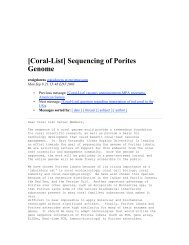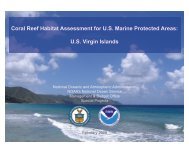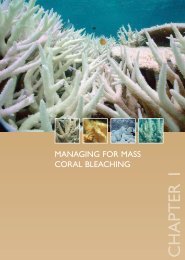Coral Health and Disease in the Pacific: Vision for Action
Coral Health and Disease in the Pacific: Vision for Action
Coral Health and Disease in the Pacific: Vision for Action
You also want an ePaper? Increase the reach of your titles
YUMPU automatically turns print PDFs into web optimized ePapers that Google loves.
Though <strong>the</strong> proliferation of coral reef diseases is a sign of a sick ocean environment, thisrealization can also be used as an <strong>in</strong>strument of change. There is grow<strong>in</strong>g evidence that<strong>the</strong> <strong>in</strong>creased severity <strong>and</strong> prevalence of <strong>the</strong>se diseases is directly l<strong>in</strong>ked to humanactivities, such as pollution wash<strong>in</strong>g off <strong>the</strong> l<strong>and</strong>, heat stress to corals, <strong>and</strong> throughoverfish<strong>in</strong>g of organisms that can control macroalgae <strong>and</strong> pest species like corallivores.By develop<strong>in</strong>g an underst<strong>and</strong><strong>in</strong>g of disease dynamics, causal l<strong>in</strong>ks can be determ<strong>in</strong>ed <strong>and</strong>factors driv<strong>in</strong>g <strong>the</strong>se system failures can be identified. Develop<strong>in</strong>g such an underst<strong>and</strong><strong>in</strong>gcan move us toward <strong>the</strong> goal of health management <strong>and</strong> preventative care <strong>for</strong> coral reefs.Recogniz<strong>in</strong>g <strong>the</strong> need <strong>for</strong> a strategic plan of action to combat <strong>and</strong> avert a possible healthcrisis <strong>for</strong> <strong>Pacific</strong> Reefs, <strong>the</strong> <strong>Coral</strong> <strong>Disease</strong> <strong>and</strong> <strong>Health</strong> Consortium (CDHC) convened aworkshop to help organize <strong>and</strong> coord<strong>in</strong>ate a U.S. scientific ef<strong>for</strong>t focused specifically oncoral health issues <strong>in</strong> <strong>the</strong> <strong>Pacific</strong>. The goal was to develop an action plan that wouldenable regional scientific ef<strong>for</strong>ts to detect, identify, characterize, <strong>and</strong> manage coraldiseases <strong>in</strong> <strong>the</strong> <strong>Pacific</strong>. This report documents <strong>the</strong> proceed<strong>in</strong>gs of this workshop: <strong>Coral</strong><strong>Health</strong> <strong>and</strong> <strong>Disease</strong> <strong>in</strong> <strong>the</strong> <strong>Pacific</strong>: <strong>Vision</strong> <strong>for</strong> <strong>Action</strong>. The goals of <strong>the</strong> workshop wereto: Syn<strong>the</strong>size <strong>the</strong> state of knowledge of <strong>Pacific</strong> coral diseases; Discuss <strong>the</strong> concepts <strong>and</strong> pr<strong>in</strong>ciples of disease, <strong>the</strong>ir use <strong>in</strong> <strong>in</strong>vestigat<strong>in</strong>g causation<strong>and</strong> how this can be applied to corals; Characterize <strong>the</strong> difficulties <strong>in</strong> identify<strong>in</strong>g, def<strong>in</strong><strong>in</strong>g <strong>and</strong> manag<strong>in</strong>g disease <strong>in</strong> coral;<strong>and</strong> Develop a Strategic Research Plan that identifies knowledge gaps that impede underst<strong>and</strong><strong>in</strong>g coral disease mechanisms(i.e., pathology), <strong>and</strong> limit elucidation of causes, significance or control of coraldisease (i.e., epidemiology); recommends directed research <strong>and</strong> education to fill <strong>the</strong>se knowledge gaps; st<strong>and</strong>ardizes methods <strong>for</strong> <strong>in</strong>vestigat<strong>in</strong>g coral disease outbreaks consider<strong>in</strong>g bothbiotic <strong>and</strong> abiotic etiologies;addresses issues relative to <strong>the</strong> management of coral reef resources; <strong>and</strong>fosters collaboration among CDHC partners, stakeholders, key mar<strong>in</strong>e resourcemanagement agencies, <strong>and</strong> regional networks <strong>in</strong> <strong>the</strong> <strong>Pacific</strong>.The workshop <strong>in</strong>corporated diverse viewpo<strong>in</strong>ts from experts represent<strong>in</strong>g biomedic<strong>in</strong>e,coral disease, toxicology, <strong>and</strong> resource management. The open<strong>in</strong>g day focused onpresentations from 14 position papers (Appendix VI), to provide context <strong>and</strong> concepts <strong>for</strong><strong>the</strong> break-out group discussions. These presentations covered key topics that <strong>in</strong>cluded:What do we currently know about coral diseases <strong>in</strong> <strong>the</strong> <strong>Pacific</strong>?What lessons have we learned from Caribbean disease outbreaks?Diagnostic methods, systems biology <strong>and</strong> leverag<strong>in</strong>g post-genomic technologiesEmerg<strong>in</strong>g diseases, disease outbreak <strong>in</strong>vestigations <strong>and</strong> ecological epidemiologyHow to <strong>in</strong>tegrate science with social, economic <strong>and</strong> political values?The participants were <strong>the</strong>n assigned to one of four groups: (1) <strong>Coral</strong> Cellular Physiology& Pathology; (2) <strong>Coral</strong> Toxicology & Ecological Epidemiology; (3) Pathology of2


